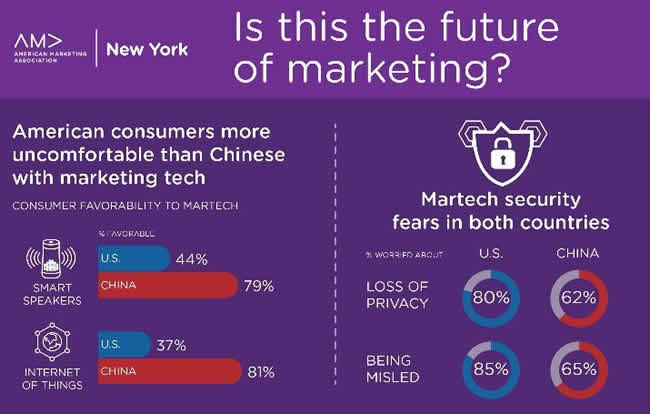Techlash has hit North America. The results will be felt across several online activities, and marketers must take action as the level and impact of consumer concerns is underrated, according to the ‘Future of Marketing: U.S. and China study’.
Marketers must step up their focus on brand trust and consumer privacy. The reason: the concerns of consumers regarding their personal data and how it will be leveraged and could potentially be jeopardized or abused are higher than many might presume.
It’s one of the conclusions from research by the American Marketing Association (AMA) New York. Worries concerning privacy and surveillance should be a reason for marketers to move as techlash has hit North America, according to AMA New York president Karen McFarlane.
The increasing techlash in a general technology and privacy/surveillance/security perspective isn’t new and has been documented in ample research and commentary pieces before. However, the apparent techlash doesn’t seem to have sunk in among many marketers yet with a disconnect between consumer perceptions and marketer’s investment plans as one of the symptoms. Although there are differences per country (in the case of this research the US and China) the concerns regarding personal data in marketing live everywhere as the Selligent Global Connected Consumer Index 2019 also showed to give another recent example.
Clearly understanding and addressing the concerns of consumers, not just in words but especially in practice, seems to be the most obvious thing to do as, in the end, consumers call the shots in what works and doesn’t in today’s integrated marketing efforts and business as a whole.

Proving to be trustworthy and genuinely focused on the customer experience and the needs of consumers while being transparent regarding personal data usage is perhaps even more important for marketers because many of the brands which are often mentioned in the bigger techlash picture are brands that marketers work with on a daily basis.
Marketers underrate consumer concerns – techlash challenges ahead
The central message in the announcement of the report is that marketers today underrate the concerns of consumers. Among the reasons why this might be the case is the fact that in practice, the results of these concerns haven’t shown too much in practice – yet. However, things are about to change according to the research (more below).
For marketers, these changing attitudes obviously come with challenges. In these days of data-driven marketing and advertising, there is a real obsession regarding customer data, coming from myriad applications and being used in multiple systems with adtech and martech (or madtech if you will) spending accounting for an all-time high percentage of the CMO’s budget.

To be transparent and able to comply with existing regulations, one thing that became clear with the introduction of the General Data Protection Regulation is that you need to know where all the data is. It’s the first step. That simple fact actually was one of the drivers of Customer Data Platforms in Europe.
The link with CDPs also comes to mind as the AMA mentions some of the ‘transformative marketing technologies’ where customer data play explicitly: the AMA particularly recommends marketers to ‘amplify brand trust and become unmatched champions of consumer privacy’ in the growing intersection of the Internet of Things (IoT), adtech, and artificial intelligence (AI). Looking at the various martech and adtech categories tackled in the research and mentioned below, the dimension of increasing touchpoints made possible by these technologies and typically another key reason for the adoption of a CDP is clearly present, as are perceptions regarding some of the reasons why CDPs are used.
How techlash will affect online usage and impacts perceptions of new technologies in adtech
How are things about to change according to the study, based upon research, conducted in partnership with Charney Research, YouGov, Kadence International and GreenBook in the U.S. and China, two markets where consumers are ahead in their overall adoption of digital technologies?
The ‘Future of Marketing: U.S. and China study‘, among others, found widespread disillusionment with social media and online marketing in the US whereby it’s expected that social media and online gaming usage will probably level off or even decline over the next three years (the results of the survey were announced end September 2019).
And here is one part of the disconnect between consumers and marketers: while social media usage and the usage of some online activities such as gaming is likely to decline – or at the very least stall – marketers intend to increase spending in these areas. 68% of advertisers anticipate increasing spending on social media marketing and 25% anticipate to do so in the online gaming category.
In China, the picture is different. Chinese consumers foresee big growth in their use of most online media in the next three years and continue to shift away from traditional media. Views differ per country indeed and it’s probably not a surprise that American consumers are far more uncomfortable with martech than their Chinese counterparts.
However, while social and online media usage will likely continue to rise in China, Chinese consumers share Americans’ concerns over hacking, false information and loss of privacy.
The AMA New York study also tackles the perceptions/attitudes that consumers have regarding adtech/martech innovations across nine categories such as IoT, VR, and omnichannel innovations. Here, as well, there are important differences:
- Chinese consumers are most positive about IoT (81%), smart speakers (79%), AI assistants (71%) and VR (70%).
- U.S. consumers don’t specifically favor one of these categories, but pluralities have a positive attitude toward VR, AI, and omnichannel innovations. The AMA thinks this might be related to the fact that these can be used voluntarily.
The conclusion for marketers in general, however, remains. There is a lot of consumer anxiety about the potential negatives of digital marketing innovations in both America and China, especially concerning privacy, false information, and psychological effects.
As the lead author of the study, Charney Research founder Craig Charney puts it ‘overall, while consumers in both countries worry about the downside of adtech, including loss of privacy, false information, and social isolation, marketers in America and China underrate these concerns’.
Fear of losing privacy and surveillance

Four in five Americans and nearly two in three Chinese polled worry that customers will lose their privacy with new adtech and martech innovations — while consumers in both countries express widespread fear that they will feel under constant surveillance due to it.
The fear that fake accounts, falsehoods, hackers and bots will mislead consumers is a concern for 85% of Americans and 65% of Chinese respondents.
Many marketers in both countries are missing this according to the research. On average 37% of marketers in China and 74% in the U.S. believe consumers will be troubled by these issues, again indicating that they underestimate consumer concerns. For online marketing and platforms to succeed globally, marketers need to address consumer concerns now says AMA New York.
Something to consider as a marketer since underrating what consumers think and feel is obviously the last thing you want to do.
Note: the report also zooms in on (the impact of) the growth of economic nationalism in the US and China.

